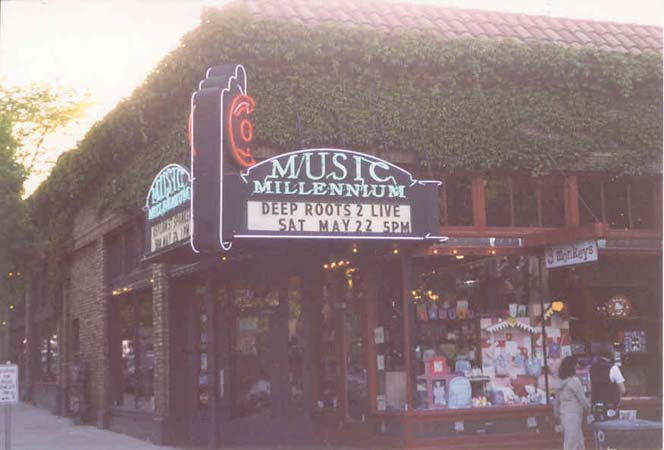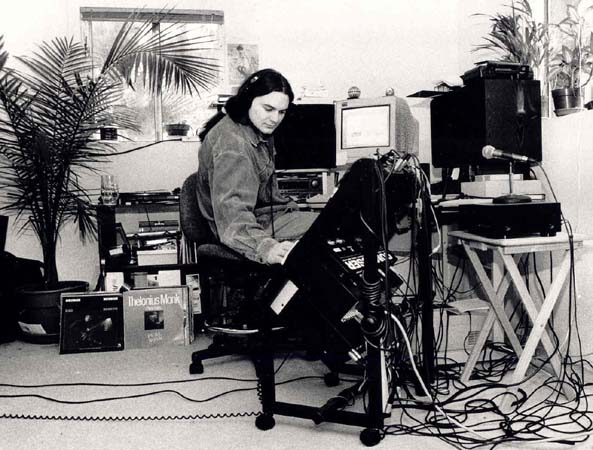











![]()
 In
1998, my students and I started The Deep Roots Music
Project at Reynolds High School in Troutdale, Oregon. The project was a somewhat
spontaneous response to a prevailing sense of apathy toward poetry and writing I
noticed among the seniors in my English class at the time. As their teacher, and
also one who holds a sincere passion for language, I'd found myself entirely
frustrated and sometimes worn out by my students' sleepy lack of enthusiasm.
Yet, I was still unwilling to accept their disengagement as an inevitability.
Two years into my teaching career, I was desperate to discover a better way to
teach high school English.
In
1998, my students and I started The Deep Roots Music
Project at Reynolds High School in Troutdale, Oregon. The project was a somewhat
spontaneous response to a prevailing sense of apathy toward poetry and writing I
noticed among the seniors in my English class at the time. As their teacher, and
also one who holds a sincere passion for language, I'd found myself entirely
frustrated and sometimes worn out by my students' sleepy lack of enthusiasm.
Yet, I was still unwilling to accept their disengagement as an inevitability.
Two years into my teaching career, I was desperate to discover a better way to
teach high school English.
Then I had an idea. I remembered myself as a teen. I had been rebellious, moody, and like my students, I was often disengaged in the classroom. But even then, there were certain things about which I was absolutely passionate. One of those things had been writing. Another had been music. Back then, if I was angry, or heartbroken, or frustrated, or confused, I'd often hole up in my bedroom, thumb through my record collection, and listen to music. I'd listen carefully to the words in each song I played, by bands like The Who and The Clash, or by songwriters like Bob Dylan and Bob Marley, and that was my therapy. That's what got me through the whole difficult ordeal of adolescence. Maybe, I wondered, I could find a way to use music to inspire my students as well.
It started simply enough. Together in class, we
played songs on a portable CD player, and we read along using printed lyric
sheets. What ensued were the most enthusiastic and thoughtful conversations of
the entire school year. Almost without prompting, the students generated
energetic, organic discussions regarding the use of metaphor, imagery, cliché,
theme, and countless other literary concepts that, until then, I had been
altogether unsuccessful at jamming down the their throats. Soon, they
were voluntarily bringing in CDs and lyrics from the music they listened to
outside of class.
Some began to notice that many of the popular songs they heard through the
mainstream media lacked the level of depth and meaning they craved.
Attendance improved. So did behavior and
participation. Best of all, so did my belief that I could make a difference as a
teacher.
It was such a hit, I decided to see how our lyrical approach might transfer over to our writing curriculum. I gave the students time in class, and encouraged them to write their own lyrics for a song. This caused one student to wonder, "Why are we writing music lyrics if we don't have any music to go along with them?" It was a really good question. In fact, it was so good that three months later we'd written lyrics, recruited local professional musicians to transform the lyrics into songs, enlisted a recording studio and an engineer, and finished our first CD, a twelve song compilation called "Deep Roots: the troutdale poetry experiment." We had a manufacturer produce 1,000 copies, and we sold enough of those copies to reimburse a very relieved teacher, who had financed the whole thing on his credit card.
Since then, young writers at Reynolds have participated in the program nine straight years. Each year the scope of the project grows a little bit more. Over the years, Deep Roots established this web site, organized an annual musician-led songwriting workshop, and began to involve students in all tasks necessary to produce, promote, and celebrate each annual Deep Roots music CD, including; musical performance, the recording process, the creation of cover art, graphic design, as well as running marketing and publicity campaigns.
As a testament to the impact the program has on students' lives, most of our past participants stay connected to Deep Roots long after they finish high school. Many return each year to help the current participants celebrate at our annual CD release parties. Some contribute financial support, and others revisit their old classrooms as professional musicians themselves, eager to mentor burgeoning writers in a program that helped them to believe in their own abilities along the way.
In 2006, we expanded the program to Portland’s Roosevelt High School, and in 2007, established another project at Girls Inc. of Northwest Oregon in Portland. We hope the network will continue to grow.
Chris Gragg
Director
The Deep Roots Music Project
www.deeproots.com